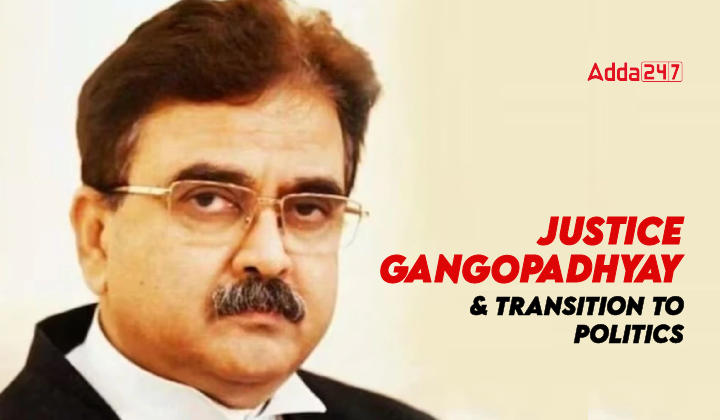Table of Contents
Justice Abhijit Gangopadhyay’s recent resignation from the Calcutta High Court to join the Bharatiya Janata Party (BJP) has sparked a significant debate on the ethical boundaries and post-retirement engagements of members of the judiciary. Known for his contentious tenure, Justice Gangopadhyay’s interactions with the media and his rulings had already stirred discussions on judicial conduct prior to his political foray.
The Political Leap and Its Implications
- Dual Approach: Justice Gangopadhyay’s engagement with the BJP, both as an approacher and the approached, during his time as a judge, raises questions about the impartiality expected of judicial figures.
- Public and Legal Reactions: His actions have invited criticism from various quarters, including the Chief Justice of India, who emphasized that judges should refrain from media interactions on ongoing cases, and the Chief Minister, who questioned the credibility of his judgments.
Absence of Legislative Controls on Judicial Conduct
The Indian Constitution safeguards judicial independence, a cornerstone of a robust legal system. This principle was evident in the Constituent Assembly’s rejection of a proposal by K.T. Shah to legally bar judges of higher courts from assuming executive positions.
Rationale for Non-intervention:
- Preservation of Judicial Independence: Imposing external regulations on judicial conduct would undermine the fundamental principle of an independent judiciary. Free from undue influence, judges can deliver impartial judgments based solely on the law and established legal procedures.
- Judgeship as a Vocation of Sacrifice: Transitioning to a judgeship often entails substantial personal sacrifice. Lawyers relinquish a degree of professional autonomy and temper personal ambitions to fulfill their judicial responsibilities.
Potential Concerns:
- Power Disparity and Limited Oversight: Judges of constitutional courts wield significant authority and enjoy unique privileges, including:
- Stringent Removal Process: Articles 217 and 124(4) of the Constitution establish a formidable hurdle – impeachment by Parliament – for removing a judge.
- Contempt Power: Article 215 empowers High Courts to invoke contempt proceedings, a power vested in the judges.
This scenario resonates with the observation made by jurist Alan Dershowitz, who pointed out the inherent vulnerability of judges due to their concentrated power coupled with robust protective measures.
Judicial Conduct
The Indian judiciary shoulders a crucial responsibility in upholding the rule of law. This necessitates stringent ethical guidelines for judges to maintain public trust and ensure fair judgments.
Cornerstones of Judicial Conduct
- Constitutional Oath: The Third Schedule of the Constitution mandates judges to solemnly swear to perform their duties “without fear or favour, affection or ill-will” (Paragraph VIII). This commitment ensures unbiased decision-making.
- Bangalore Principles of Judicial Conduct (2002): Gaining international recognition, these principles outline essential judicial values:
- Independence: Free from external influence.
- Impartiality: Unbiased judgment based solely on the law.
- Integrity: Upholding moral principles and ethical conduct.
- Propriety: Maintaining decorum and avoiding impropriety both on and off the bench.
- Equality: Ensuring fair treatment for all appearing before the court.
- Competence and Diligence: Possessing the necessary legal expertise and dedication to deliver well-reasoned judgments.
- Avoiding Bias: Judges must actively eliminate prejudice from their decision-making. Clause 2.4 of the Bangalore Principles discourages judges from making comments that could potentially influence the outcome of a case. Disqualification is mandatory when impartiality is compromised.
Maintaining Judicial Dignity
- Judge as the Embodiment of the Courtroom: As U.S. judge Simon Rifkind aptly stated, the judge’s conduct shapes the public’s perception of the court. A judge’s demeanor directly reflects on the integrity of the entire legal system.
- Maintaining Impeccable Character: The Supreme Court, in C. Ravichandran Iyer v. Justice A.M. Bhattacharjee (1995), emphasized the necessity of “sterling character, impeccable integrity and upright behaviour” for judges.
- Societal Expectations: As highlighted in All India Judges’ Association v. Union of India (1991), society holds judicial officers to a high standard, expecting them to conduct themselves with utmost propriety.
Past Instances and the Need for Adherence to Evolving Standards
While historical examples like the resignations of Chief Justice Koka Subba Rao (1967) and Justice Baharul Islam (1983) to pursue political careers may have been acceptable in the past, they no longer align with the internationally recognized principles enshrined in the Bangalore Declaration.
The Need for Judicial Reform
- Enhancing Judicial Integrity: The episode underscores the necessity for the judiciary to introspect and establish stricter guidelines to prevent such transitions that could potentially undermine public confidence in judicial impartiality.
- Proposed Measures: Implementing a mandatory cooling-off period for retired judges before entering politics and adopting clearer norms on post-retirement conduct aligned with global best practices could safeguard judicial sanctity.
Conclusion: Upholding Judicial Sanctity
Justice Gangopadhyay’s transition from the judiciary to politics serves as a critical juncture for India’s legal fraternity to reassess and fortify the ethical guidelines governing judicial conduct and post-retirement engagements. Ensuring that the judiciary remains an unblemished pillar of democracy necessitates a collective commitment to transparency, integrity, and the unwavering pursuit of impartial justice.



 TSPSC Group 1 Question Paper 2024, Downl...
TSPSC Group 1 Question Paper 2024, Downl...
 TSPSC Group 1 Answer key 2024 Out, Downl...
TSPSC Group 1 Answer key 2024 Out, Downl...
 UPSC Prelims 2024 Question Paper, Downlo...
UPSC Prelims 2024 Question Paper, Downlo...




